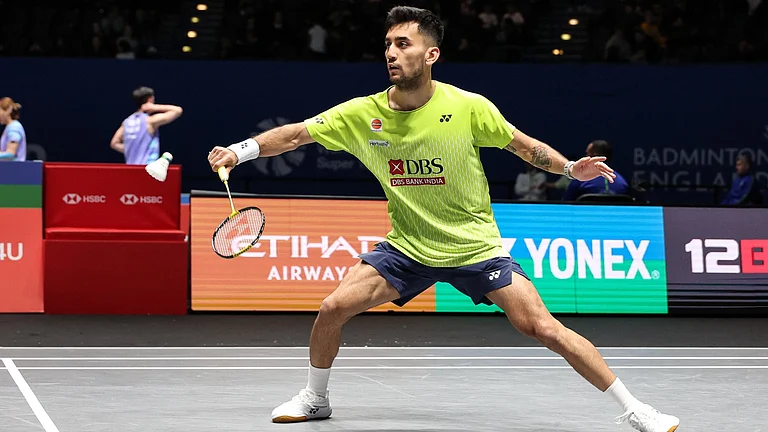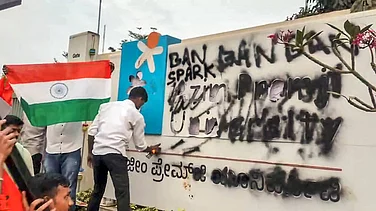In the premises of the National Conference head office at Nawai Subah, security forces usually hang their garments to dry over festoon flags of Kashmir’s grand old party. Office-bearers of the party say they don’t ask the forces to remove these clothes. “We feel hurt, but can’t do anything about it. After the revocation of Article 370, regional parties are facing an onslaught. It is sad to see our flag being covered with underwear, pyjamas and shirts. If we say anything, BJP might make it a national security issue,” says Imran Nabi Dar, spokesperson of the party, with a straight face.
But what does this act by the Indian security forces have to do with the larger debate on Indian federalism, and Jammu and Kashmir’s position within it? To start with, it reflects the sense of powerlessness prevailing among regional political parties as well as the people of J&K.
On August 5, 2019, when the BJP government abrogated Article 370 amid a military siege, a communication blackout and the arrests of thousands, including three former chief ministers, the relationship of J&K with the Centre changed dramatically. Earlier, the state had a separate constitution. Now, as a Union Territory, Jammu, Kashmir and Ladakh had become separate territories under the Indian Constitution. Earlier, regional parties sought autonomy and self-rule, but now they fear to raise any such issue. There are now widespread rumours that political leaders of the state’s regional parties are being coerced to join other parties.

Since 1950, Kashmir’s politics had revolved around the political issue of Kashmir and its resolution. National Conference would repeatedly talk of restoring autonomy to J&K as the lasting solution to the issue. Since August 9, 1953, when Sheikh Mohammad Abdullah was arrested, and J&K was relegated from an autonomous state within the Indian Union having its own PM and President, to a status equivalent to that of any other state within the Indian union, NC has been seeking restoration of the long-lost autonomy, with Article 370 acting as its bedrock. On June 26, 2000, the J&K assembly created ripples across the country, when, with Farooq Abdullah as chief minister, it passed an autonomy resolution with a voice vote.
Prior to contesting elections in 1996, Abdullah had promised greater autonomy to the people. In 1996, there were around 6,000 to 7,000 militants operating in J&K, with no political party ready to contest polls, when Dr Abdullah jumped into the fray. Later, speaking on the autonomy debate in 1999, he had said, “No one, including the NC, was ready to take up the challenge of elections then. But we were assured by New Delhi on autonomy, so we jumped into the electoral fray, putting at risk not only our lives, but also those of lakhs of people.” After the resolution was passed, copies of it were handed over to the Intelligence Bureau and the Centre. However, the then NDA government rejected the resolution.
Meanwhile, since its foundation in 1999, PDP has acted as a quasi-separatist party while seeking self-rule for J&K. Yet, in spite of their rhetoric, PDP formed the government with BJP in 2015, with Mufti Mohammad Sayeed as the chief minister, followed by his daughter Mehbooba Mufti after his death.

Now, both NC and PDP have filed petitions in the Supreme Court challenging the revocation of Article 370 and seeking restoration of statehood by giving up slogans of autonomy and self-rule.
ALSO READ: Federalism And The Idea Of Regionalism
Despite raging conflict and insurgency, J&K under Article 370, which governed the Centre’s relationship with Jammu and Kashmir and was seen as an essential facet of India’s federalism, was enjoying its fruits. Constitutional experts and political parties in the state, especially NC and PDP, would always describe Article 370 as a tunnel through which the Constitution of India is applied in Kashmir. In 2014, NC vice president Omar Abdullah famously said Article 370 is the only link between J&K and the rest of India.
It must be said here that Jammu and Kashmir was not the only state enjoying special status in matters of land and identity. Under Article 371A, Nagaland also enjoys a special status, and no act of Parliament is automatically extended to Nagaland in matters of religious or social practices, ownership and transfer of land and resources, unless the state legislative assembly takes a call on it. In spite of Article 370, industrialists from across the country could get land on 90-year lease in J&K. Now, political parties in the Ladakh UT are seeking full statehood for their region, along with Article 371A like guarantees.
“GoI’s agenda of undermining and trampling the spirit of federalism started with J&K,” Mehbooba tells Outlook. “Never in Indian history was a state demoted to a UT and robbed of its special status. More so, in a conflict region, centralised rule with an iron fist and obliterating the middle ground of mainstream parties is fraught with danger. Alarm bells for regional and opposition parties should ideally have rung in 2019 itself, when Article 370 was abrogated,” says the former CM.

“But perhaps the opposition didn’t anticipate that this model would be replicated in other states too. Whether it was expanding the BSFs jurisdiction in Punjab and West Bengal, or the rude behaviour of BJP-appointed governors in opposition-ruled states, it is clear these are all a follow-up to what was done in Kashmir,” she adds.
While Mehbooba calls the abrogation of Article 370 on August 5, 2019 the root cause of the disempowerment of the people of J&K, many academics feel the former state hasn’t enjoyed the fruits of Indian federalism right since 1950.
Professor Siddiq Wahid, former vice-chancellor of Islamic University of Science and Technology at Awantipora, says India has never seriously dealt with the idea of regionalism or federalism. “You won’t find the word ‘federal’ anywhere in the Constitution of India!” he says.
“The reason for this is that at the time of independence, neither the domestic leadership nor foreign powers were confident that the new nation would survive. The fear of break-up was expressed by the use of the term “fissiparous tendencies”. This fear introduced a bias—which still exists—against giving regions their due. And now it has become habituated. The fate of J&K is an extreme example of this fear, but if you examine India’s post-Independence history, you will note that centralisation has always been the thrust of New Delhi’s agenda,” Prof Wahid says.
ALSO READ: Renegotiating India’s Federal Compact
He adds that New Delhi is willing to “decentralise” power in states by breaking up larger ones, such as forming Chhattisgarh, Uttarakhand and Telangana, but it has never been willing to decentralise the powers of the Centre. “Specific to J&K, and in particular where it concerns us in Kashmir, the Government of India has whittled away at the first contract it formed with us—the Delhi Agreement of 1952—which was contravened the very next year (1953) with Sheikh Abdullah’s arrest. So, Delhi has always been insincere with promises contained in things like Article 370 or the “accommodation” of Article 35A, while Kashmiris have been naive.”
He adds that this reality will never be admitted by an Indian nationalist, be they “liberal” or “Hindutva”. “It is this foundational insincerity, of which all political parties at the Centre have been guilty, that has led to a collapse of trust between Delhi and Srinagar,” he says.
Right now, fear and a sense of disempowerment prevails across both Kashmir and Jammu. But it is predominantly within the political class. Speaking at her Fairview residence on Gupkar Road earlier this week, Mehbooba reflected on the mood within regional parties. “Since the abrogation of Article 370, everyday life is being made complicated for people. Every other day, orders are issued to usurp even those rights of the people of J&K that they were enjoying under the Indian Constitution,” Mehbooba says. “It has become difficult to figure out who is the worst sufferer in Kashmir. You chose any field—politicians, journalists or the youth—everyone is being made to suffer. It is the only place where journalists are made to flee,” she says.
NC spokesperson Imran Nabi Dar says J&K was not the only place enjoying some guarantees under Article 370. “We were given rights by the Constitution of India. They took those away by locking us in jails, lock, stock and barrel,” Dar says. “Federalism in J&K can only be rescued by the Supreme Court. Let it hear petitions challenging Article 370. We believe the court will restore Article 370 and with it, confidence in federalism not just in J&K, but across the country,” says Dar. The majority of the people in J&K, though, are sceptical. “In J&K, people are being treated like insects. There is no hope. There is fear everywhere. Nobody is talking. It has been almost four years since the assembly was dissolved, we still don’t have elections,” says former minister and Panthers Party leader Harsh Dev Singh. “In other states, there is democracy. Elections are held on time. We have a proxy rule in J&K. There is no federalism when it comes to J&K,” says Singh.
(This appeared in the print edition as "State of Exception in Paradise")
ALSO READ
Naseer Ganai in Srinagar





















